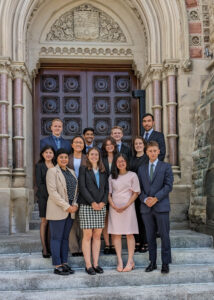Application information
- Applications for the 2024-25 PIP cohort closed January 31, 2024.
- Applications for the 2025-26 cohort (starting September 1, 2025) will open in November 2024.
- Full bilingualism is an asset, but is not required to apply (please see the FAQ for further details).
- There is no fee to apply.
Information webinars
Thinking of applying to PIP? The Programme held information webinars in early January where current and former interns discussed their experiences in the PIP and answer questions about the application process.
- English webinar – Monday, January 8, 2024
- Watch full recording – Click here
- Director’s presentation – Click here
- French webinar – Tuesday, January 9, 2024
- Watch full recording – Click here
- Director’s presentation – Click here
Have more questions?
- Volunteers from the Parliamentary Internship Programme Alumni Association (PIAA) are ready to connect with potential applicants about life in the Programme, the opportunities it provided, and the application process.
- If you would like to speak with a former intern about their experience, please email: alumni-anciens@pip-psp.org.
Eligibility
PIP is open to all candidates who, at the start date of the internship (September 1, 2024):
- Hold Canadian citizenship or permanent resident status.
- Hold at least one university or college degree (a CEGEP diploma alone is insufficient).
- Are available to work full-time from September 1, 2024 to June 30, 2025.
Selection Criteria
Candidates are assessed on the basis of the following criteria. The criteria should be clearly addressed by the applicants. Candidates’ experiences should reflect these competencies. Referees are asked to address these criteria in their letters of reference.
- Maturity (self awareness/respect for others)
- Motivation
- Research and writing abilities
- Academic achievement and/or potential
- Critical thinking skills
- Leadership
- Teamwork (ability to work with others)
- Organizational skills
- Knowledge of Parliament and Canadian politics
- Language skills
Candidates are selected by a committee comprised of the Director and representatives from the Canadian Political Science Association, the House of Commons, and the Parliamentary Internship Alumni Association.
Application Requirements
Eligible candidates must apply using the secure online PIP application system. Documents submitted in hard copy or in any other form will not be accepted. All applications are strictly private and confidential.
Candidates must provide the following information:
- Contact details
- Education, grants and scholarships
- Employment experience
- Extracurricular and volunteer activities
Each candidate will also be asked to submit the following documents to support their application:
- Personal Statement: Candidates must describe in 400 words or less how they anticipate contributing to and benefiting from the Programme.
- Approach to teamwork: Candidates must describe in 400 words or less how they managed a situation working with colleagues who had different personal or professional priorities and perspectives from their own.
- Transcripts: Candidates must upload accurate copies (in low resolution PDF or JPG formats) of each transcript (official or unofficial). Candidates chosen to participate in the Programme will be required to provide original hard copies of all official transcripts with identical information to that uploaded before receiving a letter of offer.
- Contact information for letters of reference: Candidates must provide contact information for at least two referees who have agreed to write confidential letters of reference in support of their application. One referee must be academic and one must be from an employer. Candidates may identify a third referee at their discretion. The application system will automatically request letters of reference for each referee. However, candidates are responsible for ensuring that letters are submitted. The application system will notify applicants when this occurs.
Any candidate or referee having technical difficulties with the online application system should notify IT@pip-psp.org as soon as possible. No eligible application will be refused because of technical difficulties if notice is received prior to the submission deadline.
Selection Process
Candidates are selected by a committee comprised of the Director and representatives of the Canadian Political Science Association, the House of Commons, and the Parliamentary Internship Alumni Association.
The Selection Committee will review all applications submitted by the January 31, 2024 deadline. All supporting references must be submitted online by February 5th for an application to be considered complete. It is the applicant’s responsibility to ensure their application is complete.
A shortlist of 25 candidates will be invited for telephone interviews in February or early March. The final selection of the interns will be completed in March, and all candidates will be notified about their application status by the end of the month.
FAQ
Are the interns paid?
Yes. The 2024-2025 interns will receive a salary of at least $35,000 for the ten month Programme. The PIP also pays a significant percentage of interns’ moving costs. All of the legislative study tours are fully funded and interns receive per diems during these work trips.
I do not have the same kinds of experiences as the current or former interns. Should I bother applying?
Yes! PIP welcomes applicants with diverse experiences who can bring new perspectives to Parliament and the Programme. Applicants from underrepresented groups have the option to self-identify during the application process. If you would like to speak with a former intern about their experience, please email: alumni-anciens@pip-psp.org.
Can I work for a cabinet minister or party leader?
No, cabinet ministers and party leaders are not eligible to host an intern.
How bilingual do I need to be?
You do not need to be bilingual to apply to the Programme. However, the Programme operates according to the principle of “passive bilingualism” whereby interns are expected to be able to attend meetings in either English or French and understand most of what is said, but are free to contribute to the discussion in the language of their choice.
Otherwise qualified interns who are accepted to the Programme will be offered financial support to undertake further language training in the months leading up to the Programme. All interns are also offered free language training through the House of Commons. The internship is a great opportunity for francophones, anglophones, and allophones to improve their second language skills, not only in the workplace, but also through social interactions among fellow interns and office colleagues.
I am interested in politics but don’t have a political science degree. Should I still apply?
Yes, definitely! Just like the varied backgrounds of Members of Parliament, interns hail from a variety of academic disciplines. A demonstrated interest in politics is definite must, as is a commitment to teamwork and respect for others.
What kind of hours will I be expected to work?
Interns are expected to work regular office hours, but when the House is in session, life on the Hill does not end at 5pm. Like most professional work experiences, interns get out of the internship as much as they are willing to invest in it. Interns are not permitted to take other paid employment for the duration of their internships.
What would I be doing on a daily basis in an MP’s office?
It all depends on who you work for, the amount of staff that MP has in their Ottawa office, and and what legislative priorities exist in the office. When the House of Commons is in session, tasks might be oriented towards committee research or speeches. When the House is not sitting, constituency issues may become a bigger focus for an intern.
Who picks the MPs I will work for?
The interns interview all MPs who apply to host an intern (typically 60-70 per year). With advice from the Programme Director, the interns then select their office placements as a group based on their own policy interests.
Can I apply again next year?
Absolutely! Many interns had previously applied at least once before being accepted.
I did not get an email confirming my registration account. How can I get this email?
Please check your junk mail folder. If you still cannot find the email, contact IT@pip-psp.org.
What should I do if my transcripts will not upload?
Check to make sure your transcripts are under the maximum file size (10 MB). If they are not, reduce the file’s size. As well, please, check to ensure the file name contains no special characters, including accents, commas, or exclamation marks.
My reference did not get an email with instructions for the online reference form
Please double-check that you have fully submitted your application; it is not possible to trigger the request for references until your application is complete. If you have submitted your application and your referee still cannot find the request for a letter, please ask your reference to double-check their junk mail/spam folder. If the email is not there, please ask your referee to contact us directly: IT@pip-psp.org.
How do I know if my referees have submitted their letters?
After you have submitted your application, the request for reference letters will be triggered. You can log in and check to see if your references have submitted their letters.
A Day in the Life of a Parliamentary Intern
By: Christina Vietinghoff (Intern 2015-2016)
It’s 7:00 am and your alarm blares – time to chug some coffee and peruse the latest headlines to get ready for another day on Parliament Hill.
Your day officially begins at 8:30 am with an early committee meeting for your Member of Parliament in Centre Block. You flash your pass and scurry on to the committee room. You sit with the other legislative assistants and listen intently as the committee debates an international trade issue you briefed your MP on the day before. When it comes to your MP’s turn to question the witness, they use the research you prepared and the questions you wrote!
By 10:30 committee is over and back in the office you start checking your emails but before you get very far, you receive a call from the constituency office about an immigration case file you have been working on. Time flies by and all of a sudden it is 11:50 so you speed walk across the Parliamentary Precinct to the Brown Bag Lunch your fellow interns organized with a famous journalist. One of her comments sparks an idea for your research paper so you jot down her contact information for later and head back to your office.
You check your inbox and just as you start responding to an email, your MP’s legislative assistant pops his head around the corner–the Member has a meeting with a lobby group in ten minutes–do you want to sit in? You grab your notebook and head into the meeting to take notes and photos for your MP’s social media account. Tomorrow, you will file the notes you took and write a follow-up letter to the group about their policy concerns.
You spend the rest of the afternoon answering emails and writing a speech about health policy that your MP will deliver the next day in the House of Commons during debate. All of a sudden it’s 5:30 pm, so it’s time to head to a reception. While at the reception, you speak with the British High Commissioner about your upcoming study tour to the United Kingdom. You chat with other staffers and interns you know from around the Hill and speculate about what tomorrow’s hot topic will be in Question Period tomorrow.
At 7:00 pm it’s finally time to head home. Walking part way with a fellow intern who lives nearby, you debate the pros and cons of the Private Member’s Bill lottery system and wave goodbye at Bronson Avenue.
Just another day on the Hill!

